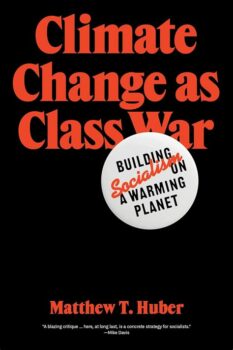This is a book of two sides.
One is a refreshingly clear identification of the capitalist system and production for profit as the cause of the climate catastrophe. Together with that comes recognition that combating climate change is a question of power rather than knowledge, and that it is the working class which is the only force with the potential to tackle this crisis. To mobilise that power, Huber proposes a Green New Deal which shares many elements with what has been written in the pages of this magazine.1 In other words, a programme to transform working people’s lives for the better while simultaneously transforming our society to one based on 100% renewable energy.
The other side, however, is a blindness to many aspects of the ecological crisis facing humanity. Huber is entirely focused on climate change and the fossil fuel emissions driving it. The four other planetary boundaries (out of the current nine) which have been crossed are almost entirely ignored.2 The same is true for the Global South, with the book solely prescribing a strategy for U.S. workers. It is this apparently wilful myopia which underlies his promotion of an eco-modernist reformism and his opposition to ecosocialist degrowth
Class struggle ecology
Huber’s key argument is “that this particular power struggle [over climate change] is a class struggle over relations that underpin our social and ecological relationship with nature and the climate itself: ownership and control of production.”3 which refuses to look behind the act of individual consumption to the entire profit-based system which has created the conditions for this consumption.
He correctly rejects the thinking behind “carbon footprint” accounting, which was first popularised by oil company BP as part of its green-washing ‘Beyond Petroleum’ ad campaign.4 It is the “hidden abode” of production which is responsible for the climatic devastation being experienced around the world. Before a consumer makes any choice, most of the important choices have already been made for them—how goods are produced, which goods are produced, how they are transported, how they are marketed. All these decisions are made on the basis of the maximisation of profit.
Knowledge is not the problem

Still Life (1931—1933) painting in high resolution by Marsden Hartley. Original from Smithsonian Institution. Digitally enhanced by rawpixel.
Huber also very effectively dismantles the idea that the obstacle to tackling climate change is lack of knowledge. For those of us in the environmental movement, this idea continues to grip even the most radical minds. One aspect of it is the idea that we need to ‘wake people up’ to what’s happening in terms of climate change. This conception lies behind brave actions such as the throwing of the soup on Van Gogh’s painting by the Just Stop Oil activists. “If people only knew, then they might join us”, so goes the thinking.
Another element is seen in the numerous environmentalists who think we simply need better and more comprehensive policies on all of the aspects of the ecological crises. Huber bluntly but accurately counters this—“we do not need better environmental policy ideas to solve climate change; we need a stronger working class.”5
We know why climate change is happening, we know how to stop it. Big oil companies knew about climate change in the 1970s, and deliberately covered it up.6 The reason for climate inaction is not because we don’t know enough. It’s because doing so goes against the material interests of the capitalist class in power.
This is not to dismiss the important work of raising awareness and consciousness about the climate and ecological catastrophe. While humanity collectively has a huge amount of knowledge about the ecological crisis, given the pressures of working life under capitalism, most people understandably do not realise the magnitude and scale of disturbance capitalism has brought about, nor the disastrous consequences for millions of lives today and soon, for all our lives. Rather, we need to recognise that spreading knowledge has to be linked to a strategy of mass mobilisation against those responsible for the crisis.
Working class as the force for change
Central to Huber’s argument is a call for “proletarian ecology”—with the working class as the agent of change with the power and interest to force climate action. To mobilise this power he argues for a strategy to “link direct, material improvements in people’s lives to climate action”, arguing persuasively that “[f]rom that basis, masses of working people might begin to see climate change not as a “cost” to bear or adjust to, but as a crisis requiring fundamental social and political transformations that improve their lives.”7
This is spot on, as are the demands that he lists as part of a Green New Deal programme—free public housing, integrating green building practices, free public transport, decommodification of health, food and housing, a shorter working week. Readers will find all of these in RISE’s ‘What We Stand For’.8
Huber also makes a persuasive call for a strategic focus on electricity workers. He argues for the need to “electrify everything” that is currently powered directly by fossil fuels. This includes the vast majority of home heating, transport and much of society’s industrial energy use. Like People Before Profit, he proposes a nationalised energy system, writing that “[o]nly publicly owned electricity can invest and plan with long-term infrastructural—and planetary—goals in mind.”9
Within that framework, he suggests a rank-and-file strategy within the electricity workers’ unions to push for them to fight for a publicly owned energy sector driving electrification and development of renewables. If socialist activists heed this advice, the trade unions and the climate movement will be stronger for it.
An educational theory of class
 While Huber’s emphasis on the working class is extremely welcome, his definition of who is in this class is strikingly weak. He professes to take a materialist approach in developing “an ecological definition of the working class as a class not only separated from the means of production (as is commonly said), but separated from the ecological means of life itself (most notably the land).”10
While Huber’s emphasis on the working class is extremely welcome, his definition of who is in this class is strikingly weak. He professes to take a materialist approach in developing “an ecological definition of the working class as a class not only separated from the means of production (as is commonly said), but separated from the ecological means of life itself (most notably the land).”10
But this promising and intriguing definition is set aside and replaced by what is effectively an educational theory of class. He refers to Kim Moody’s excellent work in mapping the U.S. working class. 11 However, instead of actually relying on Moody’s concrete method of analysis, he does a shortcut calculation to establish that 63% of the population have “associate degrees” (a technical third level education in the U.S.) or ‘less’, and effectively concludes that that is the working class. In other words, anyone with a third level university degree is not part of the working class.
He is attempting to deal with a real issue—that all of us who do not own capital do not face equal levels of exploitation, experience different levels of autonomy and suffer varying degrees of control by capital. A scientist in the civil service is selling her labour power to live, but she has a lot more autonomy at work than a Starbucks barista. Beyond that there is also a layer of managers within corporations today whose role is to oversee the production of others and to enhance their exploitation. They form part of the middle class today and will tend to have higher levels of education.
However, his solution to this problem is to lump all workers with university qualifications into the category of Professional Managerial Class (PMC).12 Despite acknowledging Moody’s point that “many professional occupations are proletarianizing”, he insists on emphasizing their difference from the rest of the working class on the grounds that “the centrality of credentials mediates their access to the labor market.”13
The problem with Huber’s approach is that he lumps together everybody who is university educated into the PMC, without any further investigation of their role in production or the levels of autonomy they have. In this way, top managers, social workers and university educated but low paid office workers are all put in one “non-working class” box.14
This approach of equating university level education to a middle class professional position may have been good as a shorthand 30 or 40 years ago. As average educational qualifications have risen rapidly over recent years, it certainly no longer is. In Ireland, for example, 46% of those between 30 and 34 have a third level degree or higher, compared to 12% of those 75 to 79 and 22% of those aged 55 to 59.15 In the U.S., despite the astronomical third level fees, educational attainment has been steadily increasing too.16 In fact, trade unions in America have a membership that is actually disproportionately well educated, with 46% of members having at least a bachelor’s degree.17
Is Huber’s working class in the Global North going to shrink and shrink as it becomes increasingly normal for working class young people to get a third level education and to have working class jobs?
The impetus for this educational workerism appears to be twofold. Firstly, a correct approach of seeking to point activists to those workers who have the most latent power at the point of production. These are workers who can grind the system to a halt (and cost the capitalists millions an hour in lost profits) by walking off the job—for example oil workers, port and truck drivers, or increasingly, logistics workers. Secondly, and unfortunately, it seems to be designed to undermine the arguments of those he disagrees with, by suggesting they are not working class.
Degrowth
A large portion of the book is in reality an argument against the ideas of degrowth, which he acknowledges are influential within the climate justice movement. However, he does not seriously engage with left-wing and socialist advocates of degrowth—neither honestly putting their views forward, nor treating this as a legitimate debate. Instead, he psychologises about the motivation of those who promote these ideas. Thus, he writes:
From the standpoint of carbon guilt—wracked by anxiety over excessive lifestyles—a politics of less is intuitively appealing.18
He contrasts this with the need for a “politics of more”. But this is a point which is only true at a superficial level, in relation to how demands are presented, and not their content. Less work can alternatively be presented as more free time. More public transport is needed to ensure there are a lot less private cars. More investment in public housing is required to ensure less emissions from inadequately insulated homes.
Huber speaks about the fact that the vast majority of people “have material interests in growth in the basics of life like health care, food, transit, and more…”19 But, this is a straw man, given that there aren’t any in the ecosocialist degrowth camp who would disagree.
He fails to engage at all with the central point made by those of us who hold an ecosocialist degrowth perspective. In order to sustain a livable future for humanity, and for a just transition for all – the workers, small farmers and indigenous peoples in the Global South as well as in the advanced capitalist countries—it is necessary to reduce total energy consumption and material throughput. That would involve degrowth to zero of energy usage on the military and advertising, drastic reductions in the usage of the super-rich, and growth in energy usage of people in the Global South. He simply ignores this argument. We have to assume that Huber’s position is that humanity can increase its total energy usage and material throughput on the basis of an expansion of clean energy and democratic planning.
The neglect of the totality of objective reality in a book which prides itself on a materialist approach is central to the flaws within Huber’s analysis and approach. He mostly ignores the other planetary boundaries which an ecocidal capitalism has crashed through. In his excellent chapter about ‘nitrogen capital’ and its role in capitalist agriculture, he is overwhelmingly focused on the impact on carbon emissions which this transformation of agriculture has had. While he does mention that humanity has overshot the natural nitrogen cycle,20 which is well beyond the agreed planetary boundary,21 he doesn’t even mention that land use change, usually linked to farming, is the primary cause of biodiversity loss.22
Presumably Huber’s sole focus on the U.S. and on climate change is why he feels able to largely ignore the substantial human and environmental costs caused by the extraction necessary for a massive expansion of clean energy. Production of clean energy is treated as almost free. But while the flow of wind, solar or wave energy comes without cost, the building of solar panels, wind turbines and lithium batteries most definitely does not. Unrestricted extraction of rare earths and minerals will push us further beyond other planetary boundaries, and destroy the environments and livelihoods of millions of people. The vast majority of these people are among the 75% of the world’s population who live in the Global South, and not the 25% who live in the Global North.
That is one of two key reasons why ecosocialists should argue for energy use reduction at the same time as developing renewable technologies in the least impactful way possible. The other is the simple mathematical fact that the more energy usage is increased, the harder it becomes to ramp up renewable energy production quickly enough to enable a full transition in time.
Ecomodernist reformism

Pink Begonias (1928-1929) painting in high resolution by Marsden Hartley. Original from Smithsonian Institution. Digitally enhanced by rawpixel.
One of the main ideas that separates revolutionary socialists from reformists is the tremendous insight that Karl Marx learned from the experience of the Paris Commune of 1871, that “the working class cannot simply lay hold of the ready-made state machinery, and wield it for its own purposes.”23 In other words, as Lenin expanded upon in State and Revolution,24 the state is not a neutral body that could be used just as well by the working class for its aims, as the capitalist class uses it. Instead it needs to be dismantled and replaced by a new, genuinely democratic state that would serve the interests of the working class in power.
Unfortunately, Huber, like Andreas Malm25 seems to cast aside this analysis. Their horizons are limited to pressuring the existing capitalist state to do what is necessary. Huber quotes Christian Parenti of Jacobin favourably:
Only states have the power to compel such [an energy] transition… [but]… states will not do this without massive popular pressure from below.26
At this point, the aims of the sort of ecosocialist Green New Deal advocated in the pages of Rupture, and that advocated by Huber diverge. His is a strategy that seeks to pressure the existing capitalist state into doing what is necessary. He refers positively to the New Deal of FDR, without mentioning that in reality it was an attempt to save capitalism, not to overcome it, and that its benefits were disproportionately and racistly distributed.27
Ours is a strategy to build an ecosocialist movement powerful enough that it could overturn and dismantle the existing capitalist state and replace it with a genuinely democratic and participative workers’ state. That doesn’t mean we don’t make demands for reforms on the existing state, but that out of the existing movements of the working class, we seek to develop a revolutionary movement capable of ending the rule of capitalists and overturning their state.
This reformism in relation to the state has as its counterpart a similar approach to technology. Huber is a self-described socialist eco-modernist. In other words, he sees technological progress as a central tool in tackling climate change.
In doing so, he rejects the more recent insight that just as the working class cannot lay hold of the state, it similarly cannot simply lay hold of the productive forces as they have been developed under capitalism.28 Max Ajl,29 Kai Heron,30 Andreas Malm31 and others have powerfully made the point that the technology we have developed is imbued with the capitalist relations which have fashioned it.
The parallel with the state only goes so far, as clearly a socialist society will not seek to ‘smash’ the technology we have inherited. But it does point to the need to reject the assumption that an ecosocialist society would continue along the lines of technological development laid out by capitalism.
Max Ajl put it extremely sharply in his ‘A People’s Green New Deal’:
The common thread of opportunist, reformist, and social democratic approaches is a blind faith in technology, a kind of magical catalyst, stardust sprinkled on the current system and capable of transforming it into a just and sustainable world ecology.32

Red Tree (1910) by Marsden Hartley. Original from Smithsonian Institution. Digitally enhanced by rawpixel.
To give a concrete example, look at the technological developments that lay behind the ‘Green Revolution’. They are presented as enormous advances which have lifted the world out of hunger. In reality, as Kai Heron puts it, its “main achievements were chronic overproduction, profits for input producers in the core, the loss of smallholder independence and suppression of communist and agrarian struggles for land reform.” 33
Huber’s critique of nitrogen capital within agriculture is excellent. But he presents no alternative to industrialised agriculture. Indeed elsewhere34 he has explicitly argued against the idea that an ecosocialist society would see a decrease in capital-intensity (and a corresponding increase in labour-intensity) in agriculture.
This is indicative of the sort of ‘big-is-beautiful’ socialism which Huber advocates. It presents socialism as continuing the line of capitalist development, but with public ownership and renewable energy. As Max Ajl put it witheringly, it is “change without change.”35
It is a reversion to the evolutionary socialism of much of the Second International. This had a Promethean idea of progress at its core, which saw the development of large monopolies as the road “being prepared for the social organisation of production”,36 without a vision of fundamental rupture from capitalism. This Promethean view of progress was not even consistently broken with by many Third International thinkers. 37
However today, when we are inundated by the symptoms of ecological breakdown, we need a revolutionary ecosocialism that breaks decisively with those aspects of our tradition. We need to reject the equation of the development of productive forces with the production of more goods and services and the usage of more energy and materials extracted from the earth.
Instead, we can gain inspiration from the vision of Marx, of a society where the development of productive forces are such that it “makes it possible for me to do one thing today and another tomorrow, to hunt in the morning, fish in the afternoon, rear cattle in the evening, criticise after dinner, just as I have a mind, without ever becoming hunter, fisherman, herdsman or critic.”38 In other words, an ecosocialist vision which sees the nature of production itself being transformed as we seek to heal the rift between humanity and non-human nature and ensures everybody on earth has a good quality of life.
Matt Huber’s book is worth reading and thinking about. It will point climate change activists in the right direction—towards the working class and the task of mobilising its power against the capitalist class. It’s just a shame that his U.S.-focused ecomodernism prevents him from developing the proletarian ecology which is needed.
Huber is right about the need for a Green New Deal-style programme39 to mobilize working class people to fight for their objective interests, improving their living standards and tackling the climate crisis. However, we need not and should not narrow the socialist horizon to that which was defined nearly 100 years ago. To avoid social and ecological catastrophe of any variety, we need an ecosocialist programme which incorporates the insights of degrowth, and a revolutionary strategy to harness the power of workers and the oppressed throughout the world to overthrow capitalism and open a new realm of freedom for humanity.
Article originally published in Issue 9 of Rupture Magazine.
Notes:
- ↩ E.g., Diana O’Dwyer, ‘The case for a socialist Green New Deal’, Rupture, Issue 1, 2020. Available online rupture.ie/articles/the-case-for-a-socialist-green-new-deal.
- ↩ The framework of planetary boundaries, which denote the “safe operating space” for humanity, is relatively new (since 2009), with some boundaries not yet defined and ongoing debate about adding other boundaries. Current research suggests we have crossed 5 or 6 of the 9 or 10 identified boundaries: climate change, ocean acidification, stratospheric ozone depletion, biogeochemical flows (nitrogen and phosphorus cycles), freshwater use, land system change, biodiversity, chemical pollution, and atmospheric aerosol loading.
- ↩ p. 3, Huber, ‘Climate Change as Class War’ (Verso, 2022). All further page numbers are to Matt Huber’s book.
- ↩ Ibid, p. 13
- ↩ p. 294
- ↩ This excellent presentation outlines Exxon Mobil’s history of research and cover up on climate change: www.europarl.europa.eu/cmsdata/162144/Presentation%20Geoffrey%20Supran.pdf
- ↩ p. 198, Huber, ‘Climate Change as Class War’ (Verso, 2022)
- ↩ www.letusrise.ie/what-we-stand-for
- ↩ p. 241
- ↩ p. 46
- ↩ Kim Moody, ‘On New Terrain’ (Haymarket Books, 2017)
- ↩ This was a term first proposed in 1977 by Barbara and John Ehrenreich in an article entitled ‘The Professional-Managerial Class’ in ‘Radical America’. It is available online library.brown.edu/pdfs/1125403552886481.pdf
- ↩ p. 118
- ↩ It isn’t even clear whether Huber considers teachers to be working class or not. He refers positively to the teachers’ strikes but also writes on p. 184 “To the extent that some social workers and teachers might subjectively show contempt for their working-class clients and students, the working class also has good reason to return it with equal vigor.”
- ↩ www.cso.ie/en/releasesandpublications/ep/p-cp10esil/p10esil/le/
- ↩ According to the U.S. Census, “From 2010 to 2019, the percentage of people aged 25 and older with a bachelor’s degree or higher jumped from 29.9% to 36.0%.” www.census.gov/newsroom/press-releases/2020/educational-attainment.html
- ↩ Economic Policy Institute factsheet, ‘Who are today’s union workers?’ (21 April 2021) www.epi.org/publication/who-are-todays-union-workers/
- ↩ p. 147
- ↩ p. 170
- ↩ p. 91
- ↩ Stockholm Resilience Centre, ‘The nine planetary boundaries’ (www.stockholmresilience.org/research/planetary-boundaries/the-nine-planetary-boundaries.html)
- ↩ World Wildlife Fund, ‘Living Planet Report 2020’ (www.zsl.org/sites/default/files/LPR%202020%20Full%20report.pdf)
- ↩ Karl Marx, ‘The Civil War in France’ (1871) (/www.marxists.org/archive/marx/works/1871/civil-war-france/ch05.htm)
- ↩ V. I. Lenin, ‘State and Revolution’ (1918)
- ↩ This is evident in Andreas Malm’s provocative ‘How to Blow up a Pipeline’ (Verso, 2020)
- ↩ p. 69
- ↩ p. 218
- ↩ Michael Löwy explores this idea in ‘Ecosocialism: A Radical Alternative Capitalist Catastrophe’ (Haymarket Books, 2015)
- ↩ Max Ajl, ‘A People’s Green New Deal’ (Pluto Press, 2021)
- ↩ Kai Heron, ‘The Great Unfettering’, New Left Review, 7 September 2022 newleftreview.org/sidecar/posts/the-great-unfettering
- ↩ Andreas Malm, ‘Fossil Capital’ (Verso, 2016)
- ↩ p. 9, Max Ajl, ‘A People’s Green New Deal’ (Pluto Press, 2021)
- ↩ Kai Heron, ‘The Great Unfettering’, New Left Review, 7 September 2022 newleftreview.org/sidecar/posts/the-great-unfettering
- ↩ Matt Huber, ‘Ecosocialism: Dystopian and Scientific’, Socialist Forum, Winter 2019 socialistforum.dsausa.org/issues/winter-2019/ecosocialism-dystopian-and-scientific/
- ↩ “Change Without Change: Ecomodernism” being the title of chapter 2 of Ajl’s ‘A People’s Green New Deal’
- ↩ Ch. 3, Karl Kautsky, ‘The Road to Power’ (1937)
- ↩ A bad example of this tendency appears in chapter 8 of Trotsky’s ‘Literature and Revolution’ where he argues “Faith merely promises to move mountains; but technology, which takes nothing “on faith”, is actually able to cut down mountains and move them. Up to now this was done for industrial purposes (mines) or for railways (tunnels); in the future this will be done on an immeasurably larger scale, according to a general industrial and artistic plan. Man will occupy himself with re-registering mountains and rivers, and will earnestly and repeatedly make improvements in nature. In the end, he will have rebuilt the earth, if not in his own image, at least according to his own taste. We have not the slightest fear that this taste will be bad.”
- ↩ Part I, Karl Marx, ‘The German Ideology’ (1846)
- ↩ We should be open to move beyond calling it a “Green New Deal” as this language is increasingly co-opted by capitalist governments (e.g., European Green Deal) minus, of course, the radical content.


